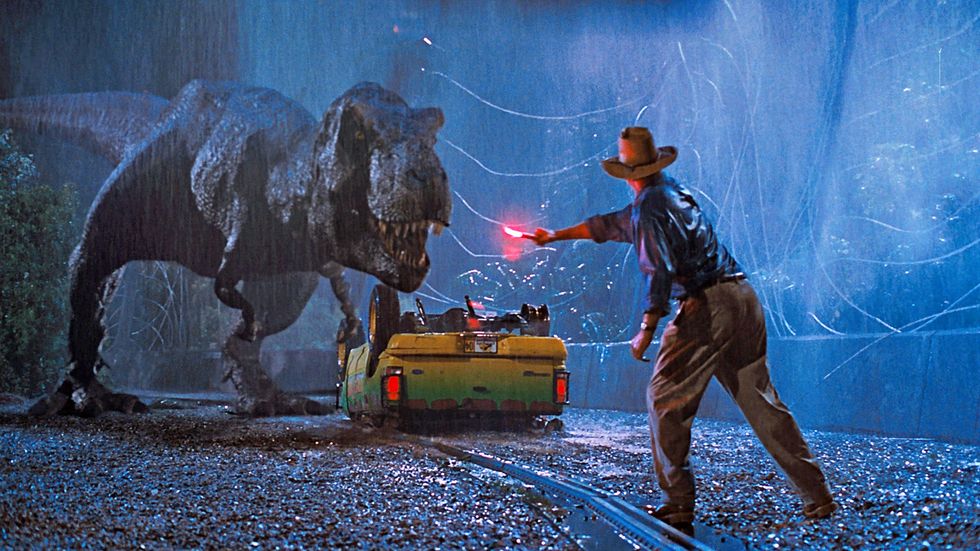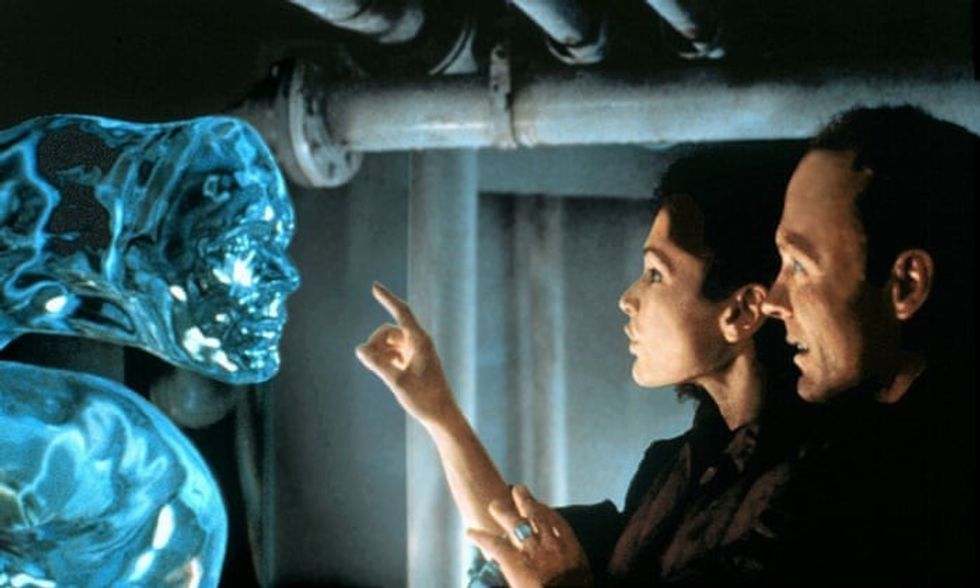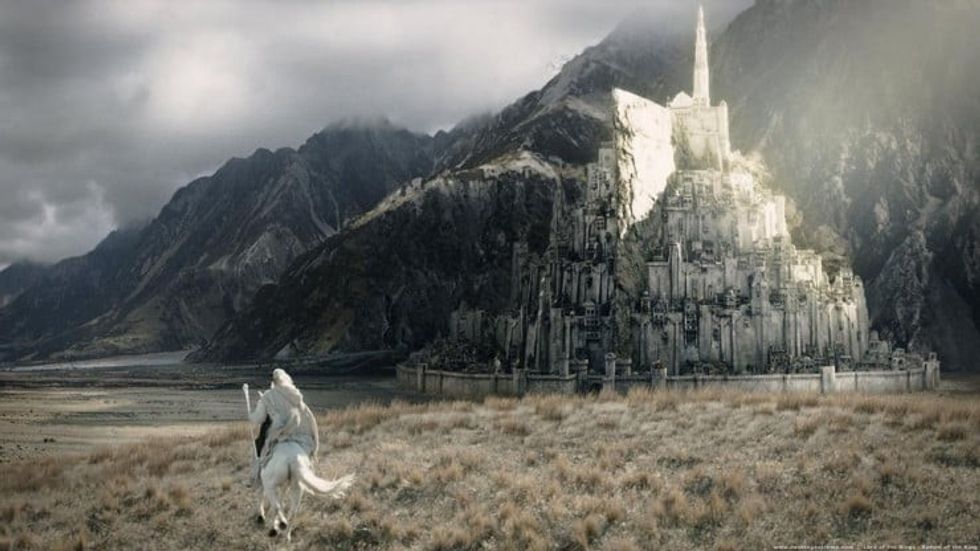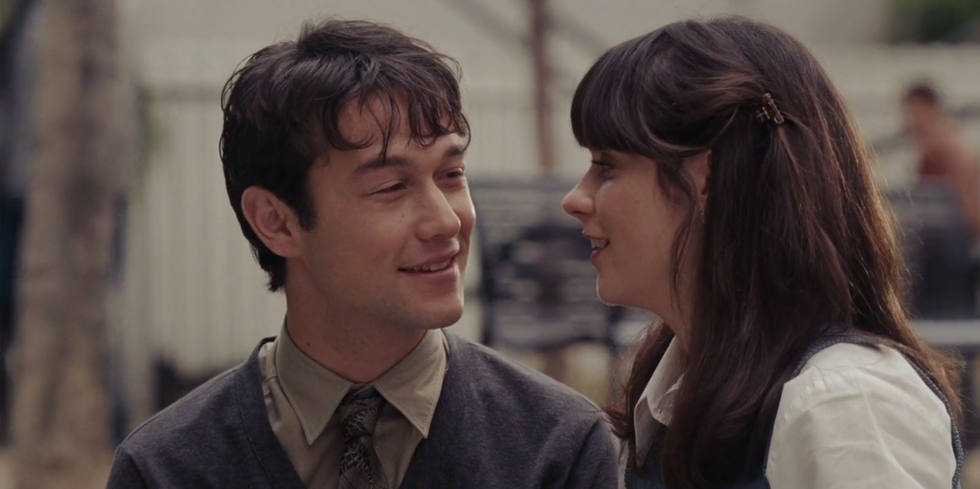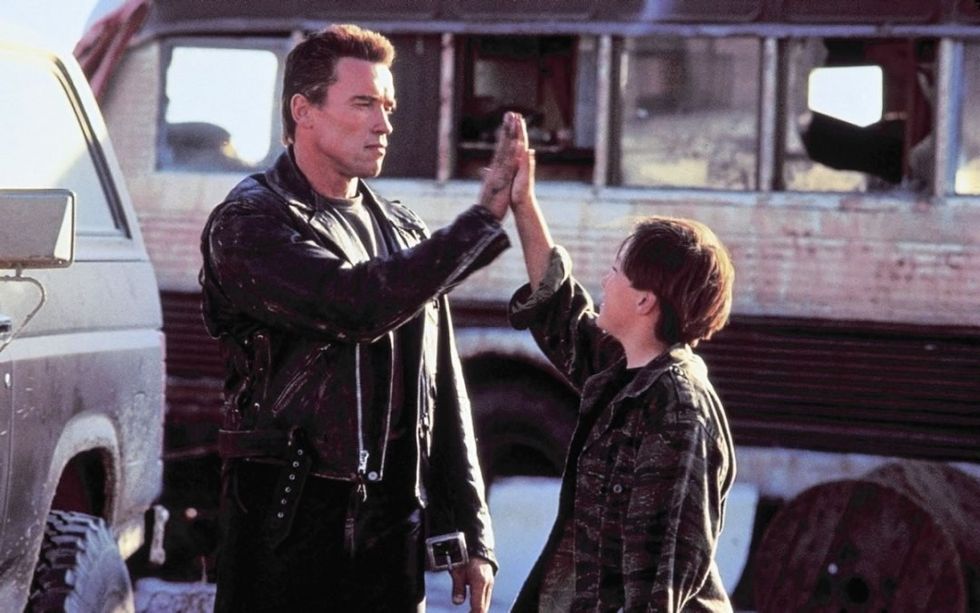Defining the War Movie Genre (Free Outline Template)
War movies are one of the consistent subgenres of Hollywood, but how can you write one? We go over the tropes and expectations of the war film and guide you on your quest to write one. Read on!
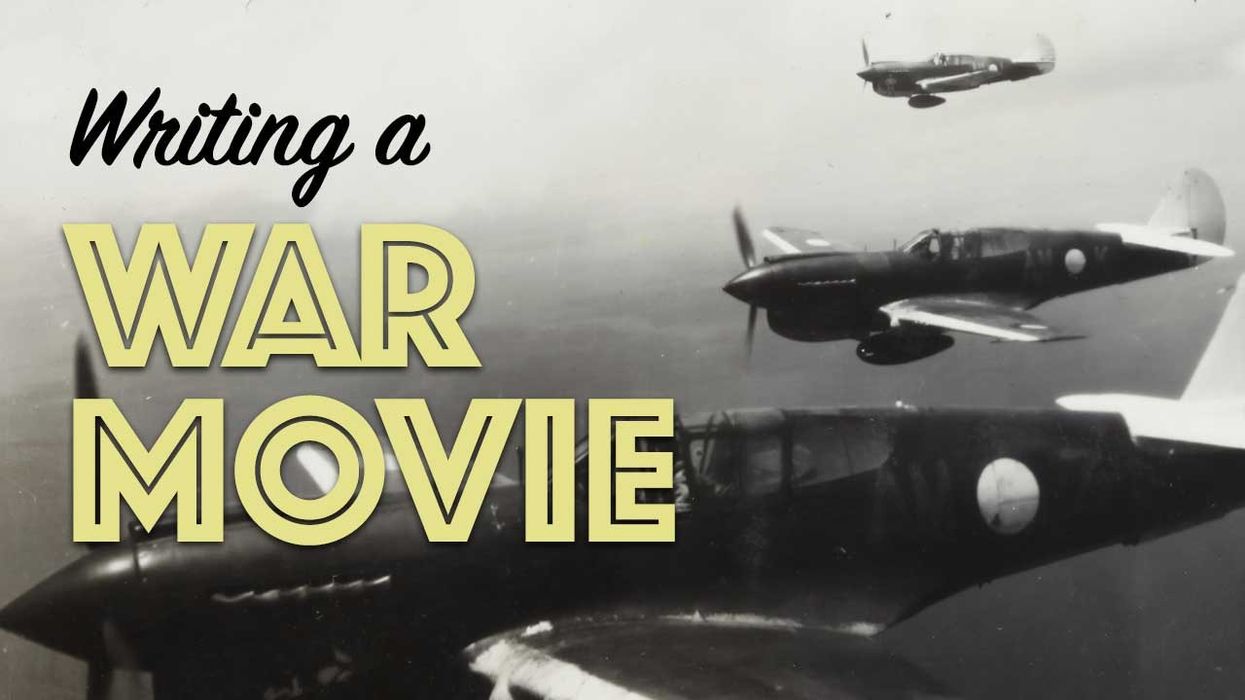
Unfortunately, the idea of war is as old as humankind. We've been fighting for millennia over land, grudges, and sometimes for noble reasons. And as soon as it became possible to film these events, we did.
There are always several war films at the box office in any given year and the very first Academy Award winner for Best Picture was a World War I movie called Wings, which came out in 1927.
So yeah, war movies are a big deal.
They're crowd-pleasers, big-budget, and often awards contenders.
Like any other subgenre, war movies come with their own set of tropes and audience expectations.
Today we're going to go over those ideas and talk about some war film examples that can help you write your own screenplay.
Let's go to war.
Top 10 Greatest War Movies of All Timewww.youtube.com
The War Genre Definition
The war movie and TV show genre is a cinematic category that focuses on depicting and exploring the experiences, events, and impacts of armed conflicts, typically within the context of historical wars or military operations.
War movies aim to capture the intense emotions, challenges, and sacrifices of soldiers and civilians during times of war.
These films can provide insights into the horrors of battle, the camaraderie among soldiers, the political and social factors leading to conflicts, and the broader consequences of war on individuals and societies.
Key elements of the war movie genre include:
- Battle Scenes and Action: War movies often feature realistic and intense battle sequences that depict combat, tactics, and strategies employed during wartime. These scenes create a visceral experience for the audience and showcase the chaos and danger of the battlefield.
- Historical Context: Many war films are based on real historical events, such as World War I, World War II, the Vietnam War, and more recent conflicts. They may strive to accurately depict the historical context, settings, and details of these wars.
- Character Portrayals: War movies typically follow the experiences of soldiers, officers, and civilians caught in the midst of conflict. These characters may undergo personal transformations, face moral dilemmas, and struggle with the physical and emotional toll of war.
- Camaraderie and Relationships: The bonds formed among soldiers and the relationships between characters often play a significant role in war films. These relationships can provide emotional depth and showcase the resilience and solidarity of individuals facing adversity together.
- Anti-War Themes: Some war movies take an anti-war stance, portraying the horrors and futility of conflict, as well as the devastating impact on human lives. These films may critique the political motivations behind war and question the justifications for violence.
- Leadership and Command: War movies may explore the dynamics of leadership within military units, highlighting the challenges faced by commanders and officers in making critical decisions that impact the lives of their troops.
- Home Front and Civilian Perspectives: In addition to portraying soldiers, war films may also focus on the experiences of civilians affected by war, including the challenges of living in war-torn areas, dealing with displacement, and the emotional toll on families.
- Post-War Consequences: Some war movies delve into the aftermath of conflict, depicting the challenges of rebuilding societies, addressing trauma, and reconciling the effects of war on a personal and societal level.
- Visual Realism: War movies often strive for visual realism, using detailed sets, accurate uniforms, weapons, and equipment to provide an authentic portrayal of the historical period and conflict.
- Patriotism and National Identity: Some war films highlight themes of patriotism, sacrifice, and national identity, exploring how individuals come together to defend their countries during times of crisis.
How to Write a War Movie
Before we get into the meat of the story, let's talk about the facts.
What is a war movie?
Technically speaking, a war movie is in the subset of the action/adventure genre and depicts the actions of men and women who fight in real-life or imaginary conflicts between dueling nations or factions.
What are some war movie tropes?
Let's make a list of wear movie tropes that occur in many entries of the genre:
- Letters home
- Discussions of the future after service ends
- Grizzled vets
- PTSD
- Bullets ping off helmets
- Fight or flight moments
- Easily identifiable characters
- A tight-knit group of men
- War room discussion by generals
- A training montage
- Someone says "Don't you die on me!"
- Photos of family members
- Paternalistic father figures
- Discussion of "What are we doing here?"
WAR STORIES - Terrible Writing Advicewww.youtube.com
Why are they so popular?
It's hard to say why war films are so popular. They feel like one of those steady Dad-appealing stories that depict humanity at their best and worst. I think people like these movies because many of them are historical epics. They connect us with the past and the deeds done by the people who gave their lives for us to be here. They can also be about current events that shed light on conflicts overseas.
If you have other reasons, leave them in the comments.
The point is, war movies are popular.
And what might surprise you is that they don't all come packaged with machine guns and a mission.
There are many different kinds of war movies.
A List of 50+ War Movies
- All Quiet on the Western Front (1930) - WWI
- Paths of Glory (1957) - WWI
- The Bridge on the River Kwai (1957) - WWII
- Lawrence of Arabia (1962) - WWI
- The Longest Day (1962) - WWII
- The Great Escape (1963) - WWII
- Dr. Strangelove (1964) - Cold War
- The Guns of Navarone (1961) - WWII
- Catch-22 (1970) - WWII
- Patton (1970) - WWII
- Tora! Tora! Tora! (1970) - WWII
- A Bridge Too Far (1977) - WWII
- The Deer Hunter (1978) - Vietnam War
- Apocalypse Now (1979) - Vietnam War
- Gallipoli (1981) - WWI
- Das Boot (1981) - WWII
- Platoon (1986) - Vietnam War
- Full Metal Jacket (1987) - Vietnam War
- The Last Samurai (2003) - 1870s Japan
- Born on the Fourth of July (1989) - Vietnam War
- Glory (1989) - American Civil War
- Casualties of War (1989) - Vietnam War
- Memphis Belle (1990) - WWII
- Schindler's List (1993) - WWII
- Stalingrad (1993) - WWII
- Braveheart (1995) - Scottish Wars of Independence
- The English Patient (1996) - WWII
- Saving Private Ryan (1998) - WWII
- The Thin Red Line (1998) - WWII
- The Patriot (2000) - American Revolutionary War
- Pearl Harbor (2001) - WWII
- Black Hawk Down (2001) - Somali Civil War
- Enemy at the Gates (2001) - WWII
- Band of Brothers (2001) - TV Mini-Series, WWII
- We Were Soldiers (2002) - Vietnam War
- Master and Commander: The Far Side of the World (2003) - Napoleonic Wars
- Jarhead (2005) - Gulf War
- Kingdom of Heaven (2005) - Crusades
- Letters from Iwo Jima (2006) - WWII
- Flags of Our Fathers (2006) - WWII
- Atonement (2007) - WWII
- The Hurt Locker (2008) - Iraq War
- Defiance (2008) - WWII
- Inglourious Basterds (2009) - WWII
- The Pacific (2010) - TV Mini-Series, WWII
- War Horse (2011) - WWI
- The Boy in the Striped Pyjamas (2008) - WWII
- Zero Dark Thirty (2012) - War on Terror
- American Sniper (2014) - Iraq War
- Fury (2014) - WWII
- The Imitation Game (2014) - WWII
- Lone Survivor (2013) - War in Afghanistan
- Hacksaw Ridge (2016) - WWII
- Dunkirk (2017) - WWII
- 1917 (2019) - WWI
- Midway (2019) - WWII
- Jojo Rabbit (2019) - WWII
- The Outpost (2020) - War in Afghanistan
Kinds of War Movies (with Examples)
War movies come in all shapes and sizes. They can have massive budgets or just be little mumblecore experiments in genre deconstruction. War is hell, and everyone has a take on it. Let's look at a few diverse examples and see what we can do.
War Epic
The war epic is a sweeping story that can carry you over multiple continents and span decades or years. Movies like Braveheart, Lawrence of Arabia, Bridge Over the River Kawai, and Dunkirk fall into this category.
They usually have sprawling casts of characters and are known for their distinct visuals.
Even 300 is labeled with this moniker.
War epics attempt to tell the whole story. Since they are so sweeping, they often involve some of the other categories below.
Men on a Mission
Who doesn't love the story of brave men and women coming together to achieve a heroic task during wartime?
Films like Saving Private Ryan can help define a filmmaker's career. Even one as big as Steven Spielberg. I mean, it worked with Francis Ford Coppola and Apocalypse Now.
But these movies don't all have to be serious dramas.
There's always Operation Dumbo Drop!
Spy Movies
Countries spy on each other all the time. But war movies usually glorify the role of the spy in getting information to stop the enemy. They work in outer space, like in Rogue One, or in reality...like Bridge of Spies. which is arguably about avoiding war.
Spy Game is about how the CIA uses spies to work out unrest, and Tinker Tailor Soldier Spy theorizes that covert operations won the war.
While not all spy movies are war movies, they represent a lot of different angles at the heart of them.
A twist would be Imitation Game, which takes the technical skills behind spying and applies to the technology.
Though you might classify that movie as...
War Adjacent
War is not just what happens on the battlefield. It can also be the backdrop for all sorts of genres. think about romantic dramas like Captain Corelli's Mandolin or the coming of age classic The Diary of Anne Frank.
Even an adventure like War Horse belongs on this list.
There are lots of movies that deal with wat at every level.
But I don't want to leave out television.
War in Television
TV provides lots of straightforward war series like Band of Brothers, The Pacific, and Generation Kill.
But there are plenty of spins, like MASH, Over There, and even a comedy like Enlisted.
It can be tricky brainstorming a plot for a television show that focuses on warfare because stories don't often lend themselves to being episodic. That's why you'll see a lot of these become miniseries or special events.
That doesn't mean they won't or can't happen, but it does mean they take time to develop or the show needs other meat. Like how This is Us told a Vietnam storyline within its other threads of the show.
The War Movie Outline
I think the real reason you came here today was to learn how to make a war movie outline. I looked at a bunch of movies, their tropes, and distilled our normal outline template down to one that helps you plan out your war film.
So take a look!
Here’s the way I see our Screenplay Outline:
Now that you've seen our nifty image, let's list out what you saw one by one.
- Bullets fly: Can you open with an image or sequence that summarizes the theme?
- What side are we on?: Right from the get-go, we need to know whose side we're on in this fight
- Why we fight: How does the world look without this conflict resolved
- Marching orders: What sets our characters off on their quest?
- Under fire: The journey begins and we see what they're up against
- Sweeping for mines: As we get deeper into the story, problems get harder.
- Another perspective: Do you have a B story? Let's look through that scope.
- Eyes on the target: You’re at the midpoint. Is there another way to win the battle?
- KIA and MIA: People in your crew are going to die, you might go missing, but can your hope survive?
- What do you want on your tombstone?: You're outnumbered and outgunned, this could be it.
- Til the death: What do your characters discover about themselves/the problem that they never saw before?
- The end is nigh: You've regrouped, and now you're about to do whatever it takes.
- Raise the flag: Did they win this battle? Win the war? Sacrifice it all?
- Lay them to rest: How do things wrap up? Can you harken back to the opening image or tell the audience?
What's next? How to Write a Screenplay in 10 weeks!
Screenwriting is hard. But to become a filmmaker, you need to learn scriptwriting to master storytelling. We'll give you free lessons.
Click to get writing!







